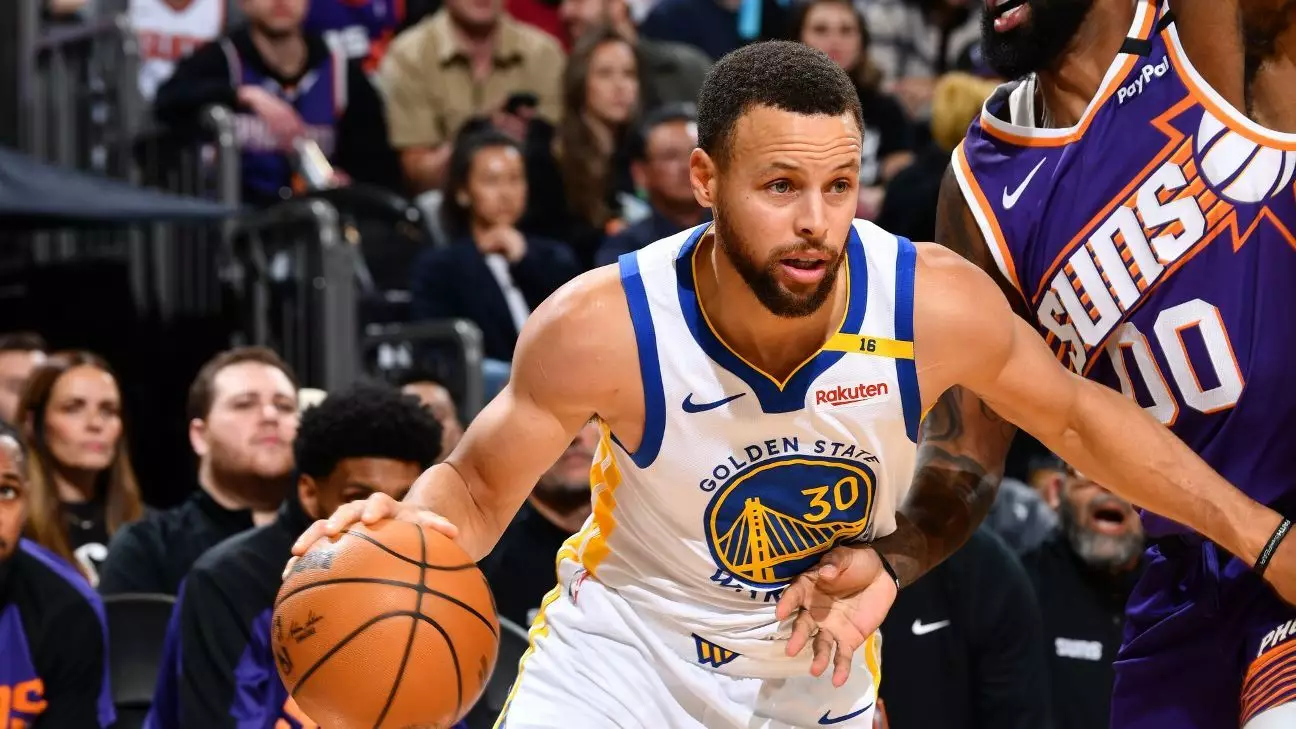Despite being one of the most iconic players in the history of basketball, Stephen Curry is confronting the harsh realities of aging as he navigates a troubling bout of knee tendinitis. The Golden State Warriors’ star recently shared insights after experiencing bilateral knee pain—an ailment he admits is new territory for him—but vows to confront it head-on in order to prevent any lingering issues. Dealing with injuries is an inevitability in professional sports, particularly as athletes age, and Curry’s current struggles are a testament to this universal truth.
At 36 years old, Curry is at a stage in his career where the wear and tear from years of intense competition is starting to manifest in physical challenges. The knee tendinitis, which made him miss a game, has become a subject of concern, not just for the player himself, but for the entire Warriors organization. Tendinitis is often an insidious injury, prone to lingering if not carefully managed—a fact that Curry is acutely aware of. After a return game where he contributed 23 points, the Warriors still faced their fourth consecutive loss—reinforcing the notion that the team’s overall performance is deeply interconnected with the health of its superstar.
Curry’s approach to the injury exemplifies an evolving mindset that’s common among seasoned athletes. “It has the potential [to be] like a nagging type thing if you don’t take care of it,” he declared, emphasizing the importance of proactive management. This is not merely about being physically fit; it’s about crafting a sustainable strategy that takes into consideration the realities of aging and the rigors of a full NBA season.
Curry’s candid reflections highlight his reliance on a robust support system, including Rick Celebrini, the Warriors’ VP of player health and performance. The partnership between athletes and their medical teams is crucial, especially when injuries threaten to derail careers. Celebrini has initiated protocols aimed at tackling Curry’s knee issues, with the hope of allowing him to continue contributing at a high level without further damaging his body.
Curry remains optimistic about managing his condition while understanding the need for and the nature of potential adjustments to his playing schedule. “Honestly, I was happy to get through this one playing 30 and not feeling it go the other way,” he expressed, signaling a controlled approach rather than panic-driven decisions. This realistic perspective is especially important at a time when moments of fragility can shake a team’s confidence.
As the season progresses, one pressing question looms large: How will Curry and the Warriors manage his minutes to maximize both his health and performance? Coach Steve Kerr acknowledges the ongoing challenge of overseeing a veteran athlete’s workload. “He’s 36,” Kerr stated, recognizing the balance between keeping Curry effective on the court and safe from injury. This semi-ritualistic management of minutes has become a necessary part of NBA coaching, blurring the lines between competitive urgency and the player’s long-term health.
Curry’s performance has been inconsistent in recent games, with struggles evident in his slow start against the Phoenix Suns, where he went 0-for-5 from the field in the first half. Such fluctuations could be attributed to both the physical demands of the game and the psychological burden of injury. Despite rallying in the second half to score 15 points, it’s evident that Curry’s physical ailments impact not just him but the entire team dynamic.
Looking forward, Curry’s statement that he needs to “play better in the first half” reflects both personal accountability and an understanding of his role as a leader. As the Warriors prepare for their next matchup against Denver, where they face MVP Nikola Jokic, the stakes heighten. Each game reverberates with implications for both personal ambitions and team objectives, creating a pressure cooker in which expectations and health must be carefully balanced.
Stephen Curry’s journey through knee tendinitis serves as a microcosm of the broader issues faced by aging athletes. His proactive approach, supported by a dedicated medical team, showcases a blueprint for navigating the complexities inherent in maintaining peak health while striving for excellence on the court. The lessons learned from such experiences will not only shape Curry’s career but also inspire future generations of athletes confronting similar challenges.

